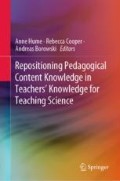Abstract
This chapter seeks to illustrate how pedagogical content knowledge (PCK) at the topic level is positioned within the Refined Consensus Model (RCM) of PCK by retrospectively applying the RCM to an existing study. It demonstrates this positioning by tracking the development of chemistry pre-service teachers’ PCK in electrochemistry across the newly conceptualised realms of collective, personal and enacted PCK. In this study, pre-service teachers are seen developing their personal PCK (pPCK) in the topic from a structured course based on collective PCK (cPCK) for the topic of electrochemistry and demonstrating part of their enacted PCK (ePCK) in the topic by developing a teaching programme on the topic. Data were collected using tools that were able to specifically measure the pre-service teachers’ pPCK in electrochemistry (pre- and post-intervention tests) and from classroom tutorial assignments during the intervention. The analysis of test data to detect shifts in the quality of pPCK was enabled using a criterion-based rubric, while a qualitative in-depth content analysis was employed on the collected assignments. Findings indicated a differentiated improvement in the pre-service teachers’ pPCK and in their ePCK for planning to teach the topic. Implications drawn for researchers in science teacher education include the importance of explicitly referencing the level or grain size of PCK under investigation in PCK studies and the realm in which the construct is located, as promoted in the RCM.
Access this chapter
Tax calculation will be finalised at checkout
Purchases are for personal use only
References
Abell, S. A. (2007). Research on science teacher knowledge. In S. A. Abell & N. G. Lederman (Eds.), Handbook of research in science education (pp. 1105–1150). Mahwah: Lawrence Erlbaum.
Abell, S. A. (2008). Twenty years later: Does pedagogical content knowledge remain a useful idea? International Journal of Science Education, 30(10), 1405–1416.
Aydeniz, M., & Kirbulut, Z. D. (2014). Exploring challenges of assessing pre-service science teachers’ pedagogical content knowledge (PCK). Asia-Pacific Journal of Teacher Education, 42(2), 147–166. https://doi.org/10.1080/1359866x.2014.890696.
Aydin, S., Friedrichsen, P. M., Bozc, Y., & Hanuscinb, D. L. (2014a). Examination of the topic-specific nature of pedagogical content knowledge in teaching electrochemical cells and nuclear reactions. Chemistry Education Research and Practice, 15(4), 658–674.
Aydin, S., Friedrichsen, P. M., Bozc, Y., & Hanuscinb, D. L. (2014b). Examination of the topic-specific nature of pedagogical content knowledge in teaching electrochemical cells and nuclear reactions. Chemistry Education Research and Practice,, 15(4), 658–674.
Aydin, S., Demirdogen, B., Atkin, F. N., Uzuntiryaki-Kondakci, E., & Tarkin, A. (2015). The nature and development of interaction among components of pedagogical content knowledge in practicum. Teaching and Teacher Education, 46, 37–50.
Darling-Hammond, L., & Richardson, N. (2009). Teacher learning: What matters? How Teachers Learn, 66(5), 46–53.
Davidowitz, B., & Potgieter, M. (2016). Use of the Rasch measurement model to explore the relationship between content knowledge and topic-specific pedagogical content knowledge for organic chemistry. International Journal of Science Education, 38(9), 1483–1503. https://doi.org/10.1080/09500693.2016.1196843.
Geddis, A. N., Onslow, B., Beynon, C., & Oesch, J. (1993). Transforming content knowledge: Learning to teach about isotopes. Science Education, 77, 575–591.
Geddis, A. N., & Wood, E. (1997). Transforming subject matter and managing dilemmas: A case study in teacher education. Teaching and Teacher Education, 13(6), 611–626.
Gess-Newsome, J. (2015). A model of teacher professional knowledge and skill including PCK: Results of the thinking from the PCK summit. In A. Berry, P. Friedrichsen, & J. Loughran (Eds.), Re-examining pedagogical content knowledge in science education (pp. 28–42). London: Routledge.
Huang, K., Lubin, I. A., & Ge, X. (2011). Situated learning in an educational technology course for pre-service teachers. Teaching and Teacher Education: An International Journal of Research and Studies, 27(8), 1200–1212.
Loughran, J. J., Berry, A., & Mulhall, P. (2004). In search of pedagogical content knowledge in science: Developing ways of articulating and documenting professional practice. Journal of Research in Science Teaching, 41(4), 370–391.
Mavhunga, E., & Rollnick, M. (2013). Improving PCK of chemical equilibrium in pre-service teachers. African Journal of Research in Mathematics, Science and Technology Education, 17(1–2), 113–125.
Nezvalová, D. (2011). Researching science teacher pedagogical content knowledge. Problems of Education in the 21st Century.
Park, S., & Chen, Y. (2012). Mapping out the integration of the components of pedagogical content knowledge (PCK): Examples from high school biology classrooms. Journal of Research in Science Teaching, 49(7), 922–941. https://doi.org/10.1002/tea.21022.
Patton, M. Q. (2002). Qualitative Research and Evaluation Methods. Thousand Oaks, CA: 3rd Sage Publications.
Shulman, L. S. (1986). Those who understand: Knowledge growth in teaching. Educational Researcher, 15(2), 4–14.
Shulman, L. S. (1987). Knowledge and teaching: Foundations of the new reform. Harvard Educational Review, 57(1), 1–22.
Van Driel, J. H., Verloop, N., & de Vos, W. (1998). Developing science teachers’ pedagogical content knowledge. Journal of Research in Science Teaching, 35(6), 673–695.
Veal, W. R., & MaKinster, J. G. (1999). Pedagogical content knowledge taxonomies. Electronic Journal of Science Education, 3(4).
Author information
Authors and Affiliations
Corresponding author
Editor information
Editors and Affiliations
Rights and permissions
Copyright information
© 2019 Springer Nature Singapore Pte Ltd.
About this chapter
Cite this chapter
Mavhunga, E. (2019). Exposing Pathways for Developing Teacher Pedagogical Content Knowledge at the Topic Level in Science. In: Hume, A., Cooper, R., Borowski, A. (eds) Repositioning Pedagogical Content Knowledge in Teachers’ Knowledge for Teaching Science. Springer, Singapore. https://doi.org/10.1007/978-981-13-5898-2_5
Download citation
DOI: https://doi.org/10.1007/978-981-13-5898-2_5
Published:
Publisher Name: Springer, Singapore
Print ISBN: 978-981-13-5897-5
Online ISBN: 978-981-13-5898-2
eBook Packages: EducationEducation (R0)

